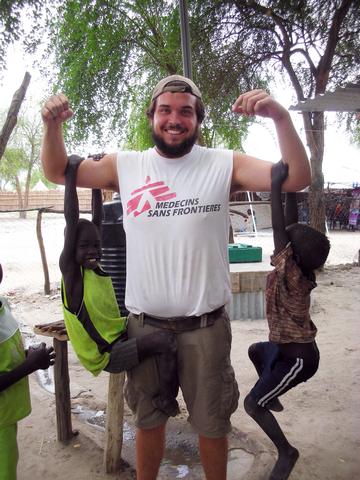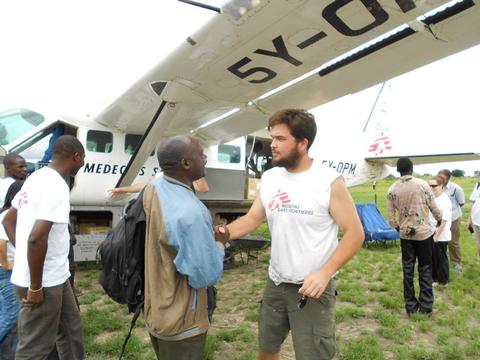Haydn Williams


I am an... aid organisation logistician
Ten-year-old Khalid saw both his parents killed and lost his brother in the Syrian conflict. Toddler Malak Qasim Mohammed suffered severe injuries and burns to her face after her house was bombed in Yemen during fighting between the Government and rebels.
Khalid and Malak are amongst thousands of injured, ill, maltreated, displaced people helped every year by Médicins Sans Frontières/Doctors without Borders (MSF).
MSF is an international medical humanitarian organisation that sends doctors, nurses, surgeons, midwives and a host of other professionals into the areas across the world that most need their help.
Haydn Williams has worked as a logistician for MSF since July 2011, when he undertook his first posting to South Sudan. Logisticians provide support to MSF’s medical programmes. They coordinate the purchase and transportation of supplies, both locally and internationally, oversee transportation and communications equipment use and maintenance, and supervise local non-medical staff.
“Logisticians are the ‘behind the scenes’ guys who make everything possible and without whom we, the medics, can’t work at all”, says Dr B Hauffe, who recently worked with MSF in Syria. “They really are the stars of the show. They made sure we always had running water and electricity and kept the show on the road.”
Haydn, from Hertfordshire, graduated from Harper Adams in 2007, with a degree in Agriculture with Mechanisation, and immediately headed to Africa, travelling down the west coast in a vehicle he had renovated himself, which gave him not just a fascination with Africa but a desire for more travel. Back at home he Googled “logistics jobs in Africa” and so began his working life with MSF.
In Sudan he lived in a tiny mud hut with no running water or electricity, and faced insect plagues and scorching heat. The 29-year-old was responsible for a clinic’s supplies, management, human resources and finance. His work enabled doctors to get on with treating patients suffering from malaria, malnutrition, dehydration, and violence. Since that initial job he has returned to South Sudan, and also worked in Myanmar.
“I love Africa and its people and being trapped in the bush hundreds of miles from anywhere is great - the friendships you make with staff and fellow expats last forever because of the intense nature of what you are doing. But Myanmar was my favourite. The context was difficult and the work challenging. But I learnt a lot about the job and myself in that time. The national staff I worked with became like family as we worked shoulder to shoulder together facing great adversity and winning!”
Haydn’s four years at university have been invaluable, he adds: “Harper Adams developed a lot of the skills that I rely on every day when working for MSF. From the workshop classes that helped my understanding of engineering and developing technical skills for when generators or oxygen concentrators fail in the middle of the night, to the social life that helps you engage with anyone and meet new friends easily!”
As for his advice to students considering a similar future career: “Flexibility is the most important skill. Being able to adapt to situations as they arise and working in different environments with lots of different people is key. Management is also important, you must be able to find someone, anywhere that can strip an engine or wire a plug, do the books or any of the other jobs around.”
You can read more about Haydn’s adventures here: tinyurl.com/haydn-times
Working for MSF
As well as medical practitioners MSF employs a range of non-medical staff such as technical and general logisticians, financial coordinators and project managers. To work in the field with MSF, every applicant must meet the following general requirements:
- At least 2 years of relevant professional experience
- Availability for a minimum of 9 to 12 months
- Relevant travel and/or work outside the UK or United States
- Experience as a supervisor, manager, teacher, and/or trainer
- Ability to work with a diverse group of professionals
- Flexibility and adaptability
- Computer skills
- Commitment to MSF's principles
- Language skills (mainly French) are not compulsory but are an added benefit.
General logisticians also need to have technical knowledge in at least two of the following areas:
- Communications
- Construction
- Energy and electricity
- General mechanics
- Information technology
- Supply chain management
- Water and sanitation
To learn more about becoming a logistician visit: www.doctorswithoutborders.org/work/field/?id=2540





